Should Assisted Dying be Legal in the UK? Arguments and Perspectives
VerifiedAdded on 2024/05/30
|11
|3004
|323
Essay
AI Summary
This essay examines the debate surrounding the legalisation of assisted dying in the UK, exploring arguments for and against it. It differentiates between assisted dying and euthanasia, highlighting the legal status of both under the Suicide Act 1961. The essay references countries where assisted dying is legal, such as Switzerland and Germany, and discusses the ethical, moral, and religious considerations involved. It also addresses the perspectives of human rights communities, healthcare professionals, and individuals like Noel Conway, who advocated for the right to choose death with dignity. The essay concludes by emphasizing the need for a comprehensive legal framework that respects individual autonomy while safeguarding against potential abuses, suggesting that legalising assisted dying could provide a more compassionate approach to end-of-life care for terminally ill individuals in the UK. Desklib provides access to similar essays and resources for students.

ACADEMIC ESSAY –
ASSISTED DYING
ASSISTED DYING
Paraphrase This Document
Need a fresh take? Get an instant paraphrase of this document with our AI Paraphraser

Table of Contents
INTRODUCTION.....................................................................................................................................2
MAIN BODY...........................................................................................................................................3
CONCLUSION.........................................................................................................................................7
REFERENCES..........................................................................................................................................8
1
INTRODUCTION.....................................................................................................................................2
MAIN BODY...........................................................................................................................................3
CONCLUSION.........................................................................................................................................7
REFERENCES..........................................................................................................................................8
1
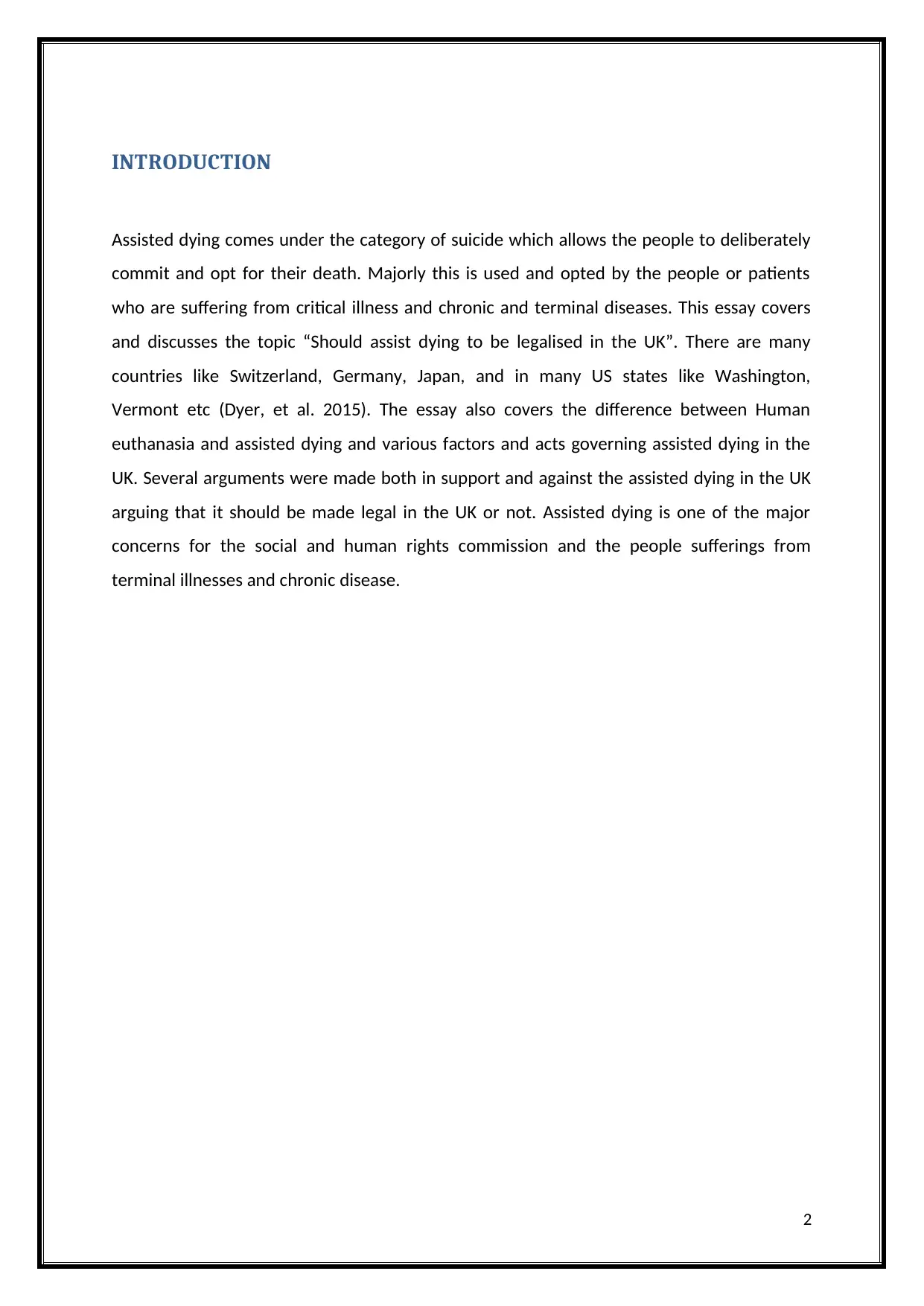
INTRODUCTION
Assisted dying comes under the category of suicide which allows the people to deliberately
commit and opt for their death. Majorly this is used and opted by the people or patients
who are suffering from critical illness and chronic and terminal diseases. This essay covers
and discusses the topic “Should assist dying to be legalised in the UK”. There are many
countries like Switzerland, Germany, Japan, and in many US states like Washington,
Vermont etc (Dyer, et al. 2015). The essay also covers the difference between Human
euthanasia and assisted dying and various factors and acts governing assisted dying in the
UK. Several arguments were made both in support and against the assisted dying in the UK
arguing that it should be made legal in the UK or not. Assisted dying is one of the major
concerns for the social and human rights commission and the people sufferings from
terminal illnesses and chronic disease.
2
Assisted dying comes under the category of suicide which allows the people to deliberately
commit and opt for their death. Majorly this is used and opted by the people or patients
who are suffering from critical illness and chronic and terminal diseases. This essay covers
and discusses the topic “Should assist dying to be legalised in the UK”. There are many
countries like Switzerland, Germany, Japan, and in many US states like Washington,
Vermont etc (Dyer, et al. 2015). The essay also covers the difference between Human
euthanasia and assisted dying and various factors and acts governing assisted dying in the
UK. Several arguments were made both in support and against the assisted dying in the UK
arguing that it should be made legal in the UK or not. Assisted dying is one of the major
concerns for the social and human rights commission and the people sufferings from
terminal illnesses and chronic disease.
2
⊘ This is a preview!⊘
Do you want full access?
Subscribe today to unlock all pages.

Trusted by 1+ million students worldwide
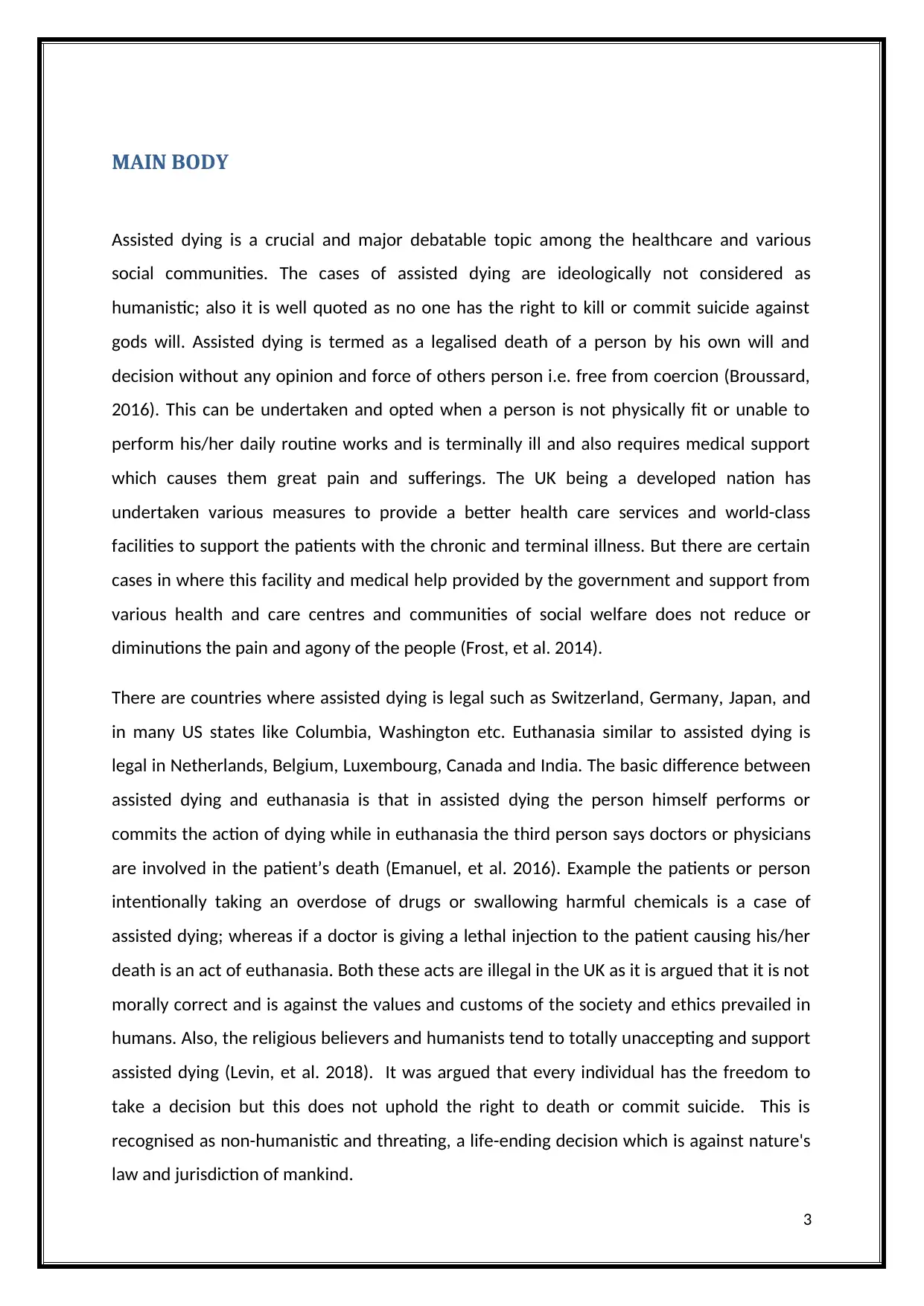
MAIN BODY
Assisted dying is a crucial and major debatable topic among the healthcare and various
social communities. The cases of assisted dying are ideologically not considered as
humanistic; also it is well quoted as no one has the right to kill or commit suicide against
gods will. Assisted dying is termed as a legalised death of a person by his own will and
decision without any opinion and force of others person i.e. free from coercion (Broussard,
2016). This can be undertaken and opted when a person is not physically fit or unable to
perform his/her daily routine works and is terminally ill and also requires medical support
which causes them great pain and sufferings. The UK being a developed nation has
undertaken various measures to provide a better health care services and world-class
facilities to support the patients with the chronic and terminal illness. But there are certain
cases in where this facility and medical help provided by the government and support from
various health and care centres and communities of social welfare does not reduce or
diminutions the pain and agony of the people (Frost, et al. 2014).
There are countries where assisted dying is legal such as Switzerland, Germany, Japan, and
in many US states like Columbia, Washington etc. Euthanasia similar to assisted dying is
legal in Netherlands, Belgium, Luxembourg, Canada and India. The basic difference between
assisted dying and euthanasia is that in assisted dying the person himself performs or
commits the action of dying while in euthanasia the third person says doctors or physicians
are involved in the patient’s death (Emanuel, et al. 2016). Example the patients or person
intentionally taking an overdose of drugs or swallowing harmful chemicals is a case of
assisted dying; whereas if a doctor is giving a lethal injection to the patient causing his/her
death is an act of euthanasia. Both these acts are illegal in the UK as it is argued that it is not
morally correct and is against the values and customs of the society and ethics prevailed in
humans. Also, the religious believers and humanists tend to totally unaccepting and support
assisted dying (Levin, et al. 2018). It was argued that every individual has the freedom to
take a decision but this does not uphold the right to death or commit suicide. This is
recognised as non-humanistic and threating, a life-ending decision which is against nature's
law and jurisdiction of mankind.
3
Assisted dying is a crucial and major debatable topic among the healthcare and various
social communities. The cases of assisted dying are ideologically not considered as
humanistic; also it is well quoted as no one has the right to kill or commit suicide against
gods will. Assisted dying is termed as a legalised death of a person by his own will and
decision without any opinion and force of others person i.e. free from coercion (Broussard,
2016). This can be undertaken and opted when a person is not physically fit or unable to
perform his/her daily routine works and is terminally ill and also requires medical support
which causes them great pain and sufferings. The UK being a developed nation has
undertaken various measures to provide a better health care services and world-class
facilities to support the patients with the chronic and terminal illness. But there are certain
cases in where this facility and medical help provided by the government and support from
various health and care centres and communities of social welfare does not reduce or
diminutions the pain and agony of the people (Frost, et al. 2014).
There are countries where assisted dying is legal such as Switzerland, Germany, Japan, and
in many US states like Columbia, Washington etc. Euthanasia similar to assisted dying is
legal in Netherlands, Belgium, Luxembourg, Canada and India. The basic difference between
assisted dying and euthanasia is that in assisted dying the person himself performs or
commits the action of dying while in euthanasia the third person says doctors or physicians
are involved in the patient’s death (Emanuel, et al. 2016). Example the patients or person
intentionally taking an overdose of drugs or swallowing harmful chemicals is a case of
assisted dying; whereas if a doctor is giving a lethal injection to the patient causing his/her
death is an act of euthanasia. Both these acts are illegal in the UK as it is argued that it is not
morally correct and is against the values and customs of the society and ethics prevailed in
humans. Also, the religious believers and humanists tend to totally unaccepting and support
assisted dying (Levin, et al. 2018). It was argued that every individual has the freedom to
take a decision but this does not uphold the right to death or commit suicide. This is
recognised as non-humanistic and threating, a life-ending decision which is against nature's
law and jurisdiction of mankind.
3
Paraphrase This Document
Need a fresh take? Get an instant paraphrase of this document with our AI Paraphraser
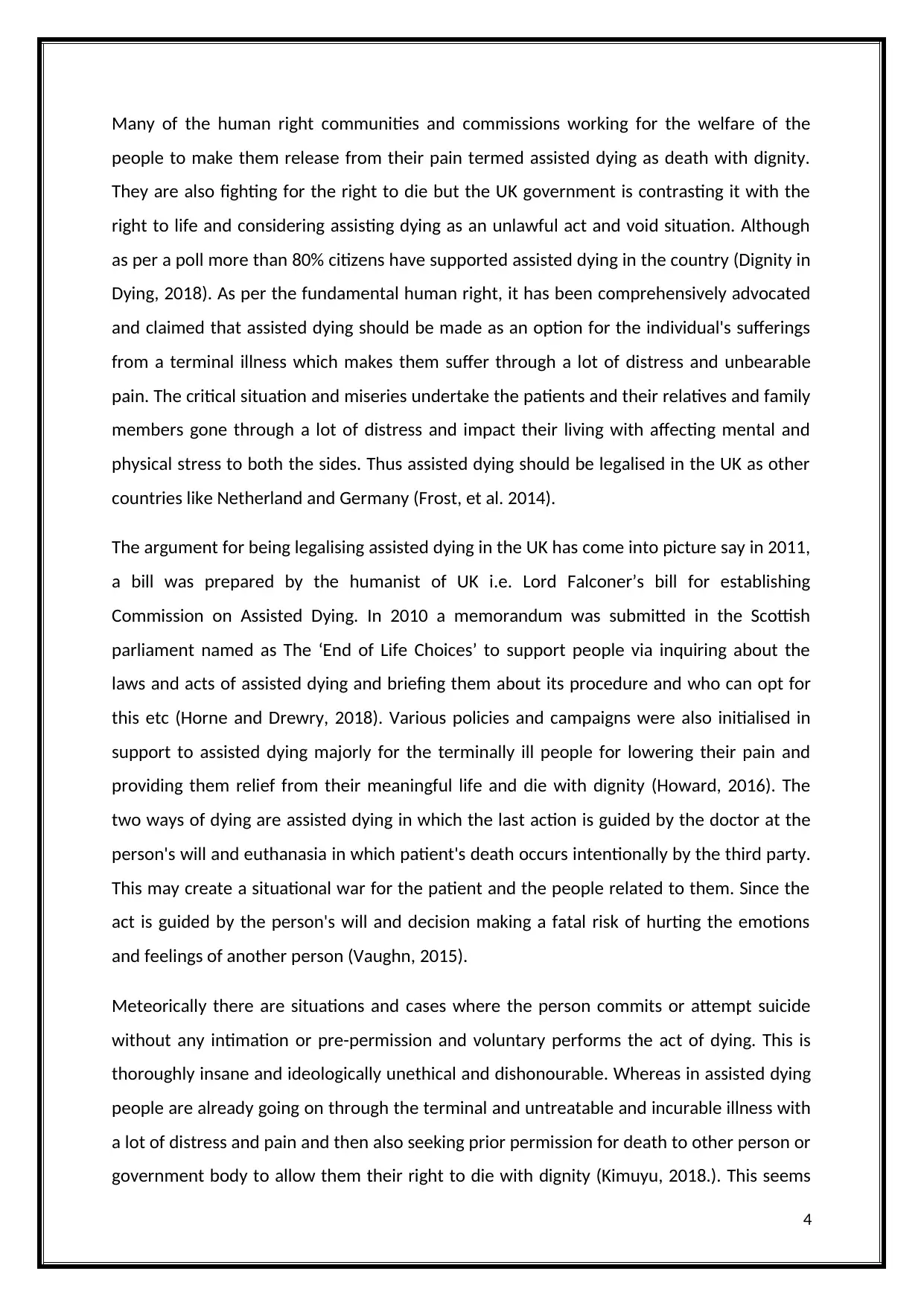
Many of the human right communities and commissions working for the welfare of the
people to make them release from their pain termed assisted dying as death with dignity.
They are also fighting for the right to die but the UK government is contrasting it with the
right to life and considering assisting dying as an unlawful act and void situation. Although
as per a poll more than 80% citizens have supported assisted dying in the country (Dignity in
Dying, 2018). As per the fundamental human right, it has been comprehensively advocated
and claimed that assisted dying should be made as an option for the individual's sufferings
from a terminal illness which makes them suffer through a lot of distress and unbearable
pain. The critical situation and miseries undertake the patients and their relatives and family
members gone through a lot of distress and impact their living with affecting mental and
physical stress to both the sides. Thus assisted dying should be legalised in the UK as other
countries like Netherland and Germany (Frost, et al. 2014).
The argument for being legalising assisted dying in the UK has come into picture say in 2011,
a bill was prepared by the humanist of UK i.e. Lord Falconer’s bill for establishing
Commission on Assisted Dying. In 2010 a memorandum was submitted in the Scottish
parliament named as The ‘End of Life Choices’ to support people via inquiring about the
laws and acts of assisted dying and briefing them about its procedure and who can opt for
this etc (Horne and Drewry, 2018). Various policies and campaigns were also initialised in
support to assisted dying majorly for the terminally ill people for lowering their pain and
providing them relief from their meaningful life and die with dignity (Howard, 2016). The
two ways of dying are assisted dying in which the last action is guided by the doctor at the
person's will and euthanasia in which patient's death occurs intentionally by the third party.
This may create a situational war for the patient and the people related to them. Since the
act is guided by the person's will and decision making a fatal risk of hurting the emotions
and feelings of another person (Vaughn, 2015).
Meteorically there are situations and cases where the person commits or attempt suicide
without any intimation or pre-permission and voluntary performs the act of dying. This is
thoroughly insane and ideologically unethical and dishonourable. Whereas in assisted dying
people are already going on through the terminal and untreatable and incurable illness with
a lot of distress and pain and then also seeking prior permission for death to other person or
government body to allow them their right to die with dignity (Kimuyu, 2018.). This seems
4
people to make them release from their pain termed assisted dying as death with dignity.
They are also fighting for the right to die but the UK government is contrasting it with the
right to life and considering assisting dying as an unlawful act and void situation. Although
as per a poll more than 80% citizens have supported assisted dying in the country (Dignity in
Dying, 2018). As per the fundamental human right, it has been comprehensively advocated
and claimed that assisted dying should be made as an option for the individual's sufferings
from a terminal illness which makes them suffer through a lot of distress and unbearable
pain. The critical situation and miseries undertake the patients and their relatives and family
members gone through a lot of distress and impact their living with affecting mental and
physical stress to both the sides. Thus assisted dying should be legalised in the UK as other
countries like Netherland and Germany (Frost, et al. 2014).
The argument for being legalising assisted dying in the UK has come into picture say in 2011,
a bill was prepared by the humanist of UK i.e. Lord Falconer’s bill for establishing
Commission on Assisted Dying. In 2010 a memorandum was submitted in the Scottish
parliament named as The ‘End of Life Choices’ to support people via inquiring about the
laws and acts of assisted dying and briefing them about its procedure and who can opt for
this etc (Horne and Drewry, 2018). Various policies and campaigns were also initialised in
support to assisted dying majorly for the terminally ill people for lowering their pain and
providing them relief from their meaningful life and die with dignity (Howard, 2016). The
two ways of dying are assisted dying in which the last action is guided by the doctor at the
person's will and euthanasia in which patient's death occurs intentionally by the third party.
This may create a situational war for the patient and the people related to them. Since the
act is guided by the person's will and decision making a fatal risk of hurting the emotions
and feelings of another person (Vaughn, 2015).
Meteorically there are situations and cases where the person commits or attempt suicide
without any intimation or pre-permission and voluntary performs the act of dying. This is
thoroughly insane and ideologically unethical and dishonourable. Whereas in assisted dying
people are already going on through the terminal and untreatable and incurable illness with
a lot of distress and pain and then also seeking prior permission for death to other person or
government body to allow them their right to die with dignity (Kimuyu, 2018.). This seems
4
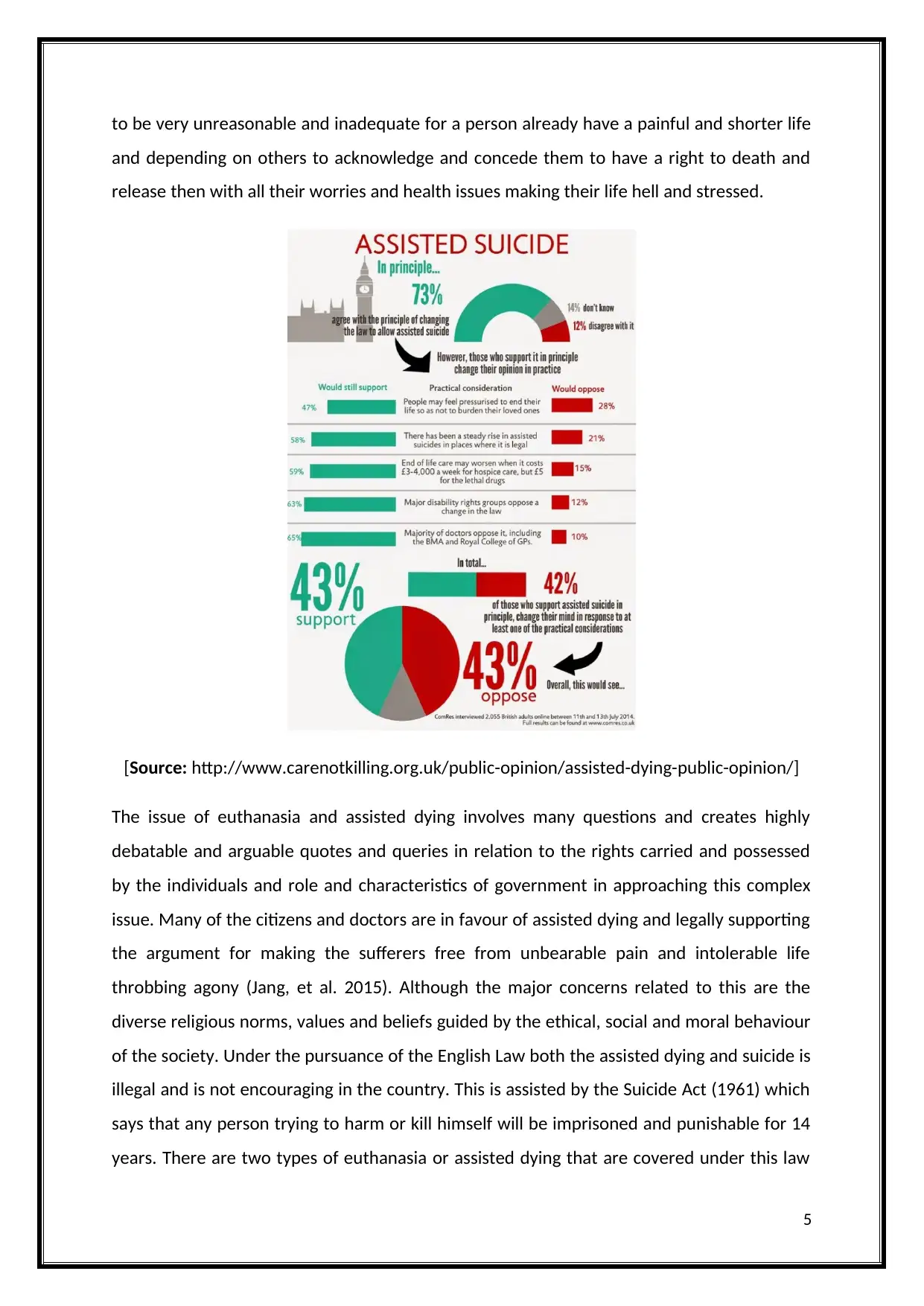
to be very unreasonable and inadequate for a person already have a painful and shorter life
and depending on others to acknowledge and concede them to have a right to death and
release then with all their worries and health issues making their life hell and stressed.
[Source: http://www.carenotkilling.org.uk/public-opinion/assisted-dying-public-opinion/]
The issue of euthanasia and assisted dying involves many questions and creates highly
debatable and arguable quotes and queries in relation to the rights carried and possessed
by the individuals and role and characteristics of government in approaching this complex
issue. Many of the citizens and doctors are in favour of assisted dying and legally supporting
the argument for making the sufferers free from unbearable pain and intolerable life
throbbing agony (Jang, et al. 2015). Although the major concerns related to this are the
diverse religious norms, values and beliefs guided by the ethical, social and moral behaviour
of the society. Under the pursuance of the English Law both the assisted dying and suicide is
illegal and is not encouraging in the country. This is assisted by the Suicide Act (1961) which
says that any person trying to harm or kill himself will be imprisoned and punishable for 14
years. There are two types of euthanasia or assisted dying that are covered under this law
5
and depending on others to acknowledge and concede them to have a right to death and
release then with all their worries and health issues making their life hell and stressed.
[Source: http://www.carenotkilling.org.uk/public-opinion/assisted-dying-public-opinion/]
The issue of euthanasia and assisted dying involves many questions and creates highly
debatable and arguable quotes and queries in relation to the rights carried and possessed
by the individuals and role and characteristics of government in approaching this complex
issue. Many of the citizens and doctors are in favour of assisted dying and legally supporting
the argument for making the sufferers free from unbearable pain and intolerable life
throbbing agony (Jang, et al. 2015). Although the major concerns related to this are the
diverse religious norms, values and beliefs guided by the ethical, social and moral behaviour
of the society. Under the pursuance of the English Law both the assisted dying and suicide is
illegal and is not encouraging in the country. This is assisted by the Suicide Act (1961) which
says that any person trying to harm or kill himself will be imprisoned and punishable for 14
years. There are two types of euthanasia or assisted dying that are covered under this law
5
⊘ This is a preview!⊘
Do you want full access?
Subscribe today to unlock all pages.

Trusted by 1+ million students worldwide
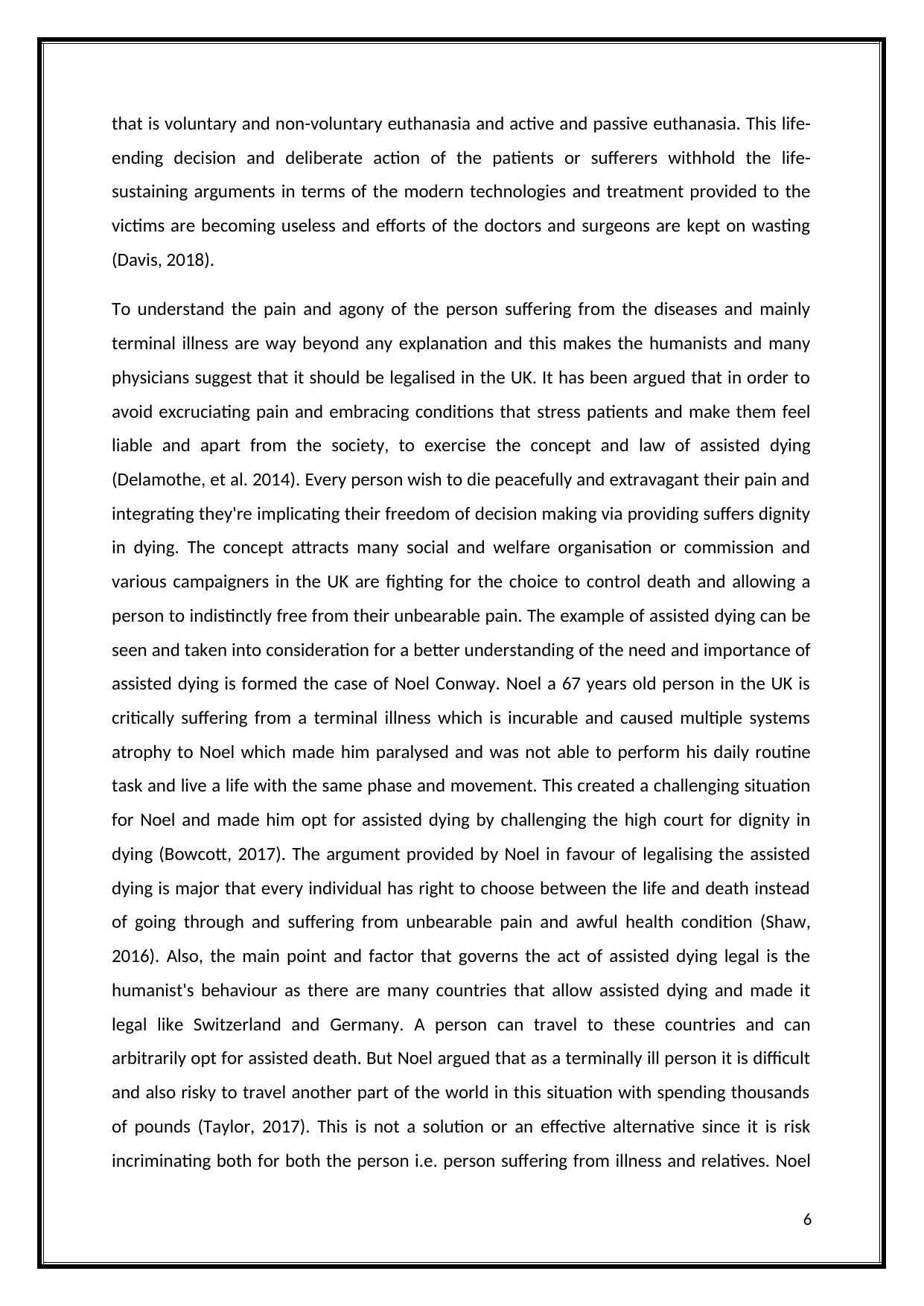
that is voluntary and non-voluntary euthanasia and active and passive euthanasia. This life-
ending decision and deliberate action of the patients or sufferers withhold the life-
sustaining arguments in terms of the modern technologies and treatment provided to the
victims are becoming useless and efforts of the doctors and surgeons are kept on wasting
(Davis, 2018).
To understand the pain and agony of the person suffering from the diseases and mainly
terminal illness are way beyond any explanation and this makes the humanists and many
physicians suggest that it should be legalised in the UK. It has been argued that in order to
avoid excruciating pain and embracing conditions that stress patients and make them feel
liable and apart from the society, to exercise the concept and law of assisted dying
(Delamothe, et al. 2014). Every person wish to die peacefully and extravagant their pain and
integrating they're implicating their freedom of decision making via providing suffers dignity
in dying. The concept attracts many social and welfare organisation or commission and
various campaigners in the UK are fighting for the choice to control death and allowing a
person to indistinctly free from their unbearable pain. The example of assisted dying can be
seen and taken into consideration for a better understanding of the need and importance of
assisted dying is formed the case of Noel Conway. Noel a 67 years old person in the UK is
critically suffering from a terminal illness which is incurable and caused multiple systems
atrophy to Noel which made him paralysed and was not able to perform his daily routine
task and live a life with the same phase and movement. This created a challenging situation
for Noel and made him opt for assisted dying by challenging the high court for dignity in
dying (Bowcott, 2017). The argument provided by Noel in favour of legalising the assisted
dying is major that every individual has right to choose between the life and death instead
of going through and suffering from unbearable pain and awful health condition (Shaw,
2016). Also, the main point and factor that governs the act of assisted dying legal is the
humanist's behaviour as there are many countries that allow assisted dying and made it
legal like Switzerland and Germany. A person can travel to these countries and can
arbitrarily opt for assisted death. But Noel argued that as a terminally ill person it is difficult
and also risky to travel another part of the world in this situation with spending thousands
of pounds (Taylor, 2017). This is not a solution or an effective alternative since it is risk
incriminating both for both the person i.e. person suffering from illness and relatives. Noel
6
ending decision and deliberate action of the patients or sufferers withhold the life-
sustaining arguments in terms of the modern technologies and treatment provided to the
victims are becoming useless and efforts of the doctors and surgeons are kept on wasting
(Davis, 2018).
To understand the pain and agony of the person suffering from the diseases and mainly
terminal illness are way beyond any explanation and this makes the humanists and many
physicians suggest that it should be legalised in the UK. It has been argued that in order to
avoid excruciating pain and embracing conditions that stress patients and make them feel
liable and apart from the society, to exercise the concept and law of assisted dying
(Delamothe, et al. 2014). Every person wish to die peacefully and extravagant their pain and
integrating they're implicating their freedom of decision making via providing suffers dignity
in dying. The concept attracts many social and welfare organisation or commission and
various campaigners in the UK are fighting for the choice to control death and allowing a
person to indistinctly free from their unbearable pain. The example of assisted dying can be
seen and taken into consideration for a better understanding of the need and importance of
assisted dying is formed the case of Noel Conway. Noel a 67 years old person in the UK is
critically suffering from a terminal illness which is incurable and caused multiple systems
atrophy to Noel which made him paralysed and was not able to perform his daily routine
task and live a life with the same phase and movement. This created a challenging situation
for Noel and made him opt for assisted dying by challenging the high court for dignity in
dying (Bowcott, 2017). The argument provided by Noel in favour of legalising the assisted
dying is major that every individual has right to choose between the life and death instead
of going through and suffering from unbearable pain and awful health condition (Shaw,
2016). Also, the main point and factor that governs the act of assisted dying legal is the
humanist's behaviour as there are many countries that allow assisted dying and made it
legal like Switzerland and Germany. A person can travel to these countries and can
arbitrarily opt for assisted death. But Noel argued that as a terminally ill person it is difficult
and also risky to travel another part of the world in this situation with spending thousands
of pounds (Taylor, 2017). This is not a solution or an effective alternative since it is risk
incriminating both for both the person i.e. person suffering from illness and relatives. Noel
6
Paraphrase This Document
Need a fresh take? Get an instant paraphrase of this document with our AI Paraphraser
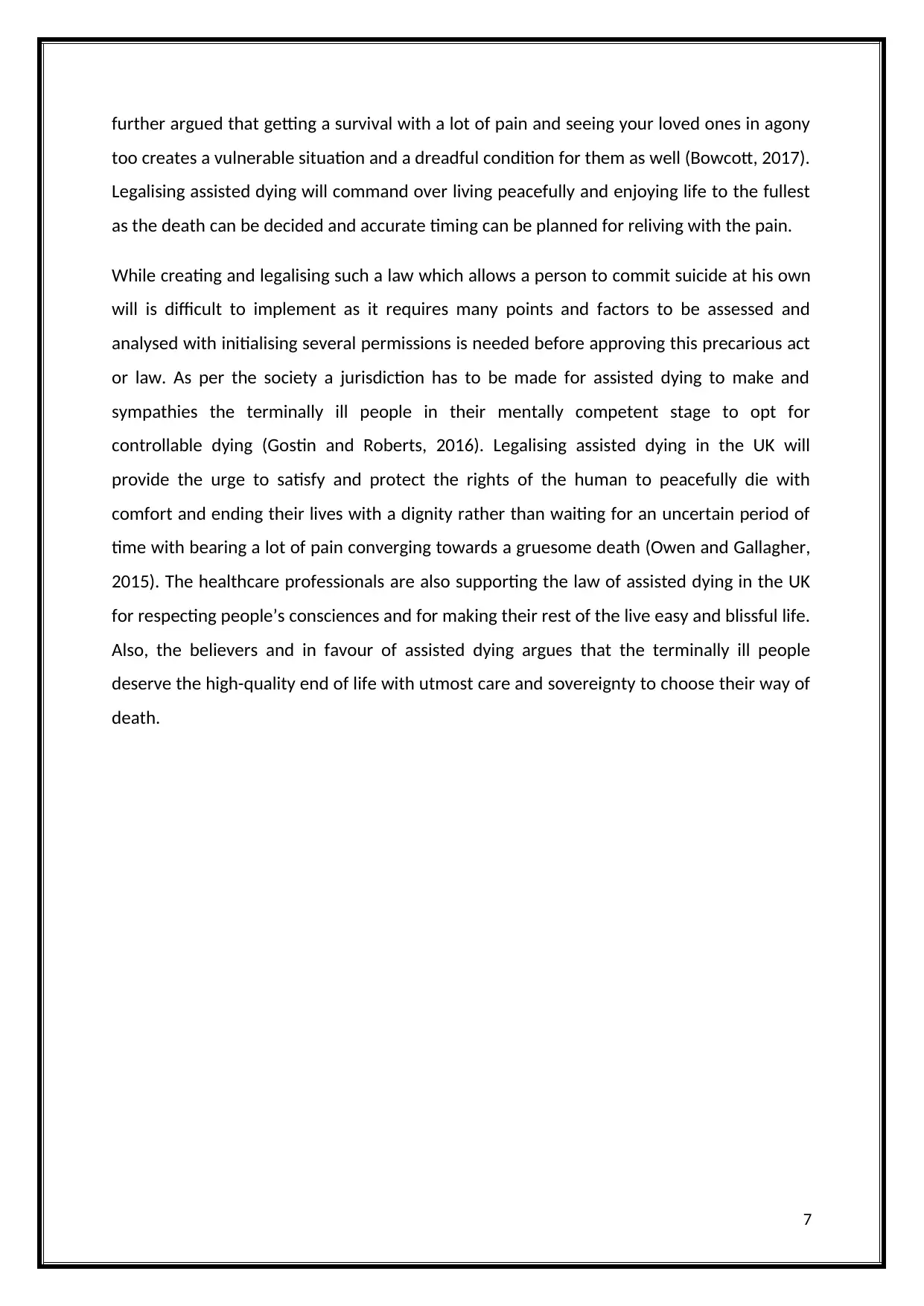
further argued that getting a survival with a lot of pain and seeing your loved ones in agony
too creates a vulnerable situation and a dreadful condition for them as well (Bowcott, 2017).
Legalising assisted dying will command over living peacefully and enjoying life to the fullest
as the death can be decided and accurate timing can be planned for reliving with the pain.
While creating and legalising such a law which allows a person to commit suicide at his own
will is difficult to implement as it requires many points and factors to be assessed and
analysed with initialising several permissions is needed before approving this precarious act
or law. As per the society a jurisdiction has to be made for assisted dying to make and
sympathies the terminally ill people in their mentally competent stage to opt for
controllable dying (Gostin and Roberts, 2016). Legalising assisted dying in the UK will
provide the urge to satisfy and protect the rights of the human to peacefully die with
comfort and ending their lives with a dignity rather than waiting for an uncertain period of
time with bearing a lot of pain converging towards a gruesome death (Owen and Gallagher,
2015). The healthcare professionals are also supporting the law of assisted dying in the UK
for respecting people’s consciences and for making their rest of the live easy and blissful life.
Also, the believers and in favour of assisted dying argues that the terminally ill people
deserve the high-quality end of life with utmost care and sovereignty to choose their way of
death.
7
too creates a vulnerable situation and a dreadful condition for them as well (Bowcott, 2017).
Legalising assisted dying will command over living peacefully and enjoying life to the fullest
as the death can be decided and accurate timing can be planned for reliving with the pain.
While creating and legalising such a law which allows a person to commit suicide at his own
will is difficult to implement as it requires many points and factors to be assessed and
analysed with initialising several permissions is needed before approving this precarious act
or law. As per the society a jurisdiction has to be made for assisted dying to make and
sympathies the terminally ill people in their mentally competent stage to opt for
controllable dying (Gostin and Roberts, 2016). Legalising assisted dying in the UK will
provide the urge to satisfy and protect the rights of the human to peacefully die with
comfort and ending their lives with a dignity rather than waiting for an uncertain period of
time with bearing a lot of pain converging towards a gruesome death (Owen and Gallagher,
2015). The healthcare professionals are also supporting the law of assisted dying in the UK
for respecting people’s consciences and for making their rest of the live easy and blissful life.
Also, the believers and in favour of assisted dying argues that the terminally ill people
deserve the high-quality end of life with utmost care and sovereignty to choose their way of
death.
7
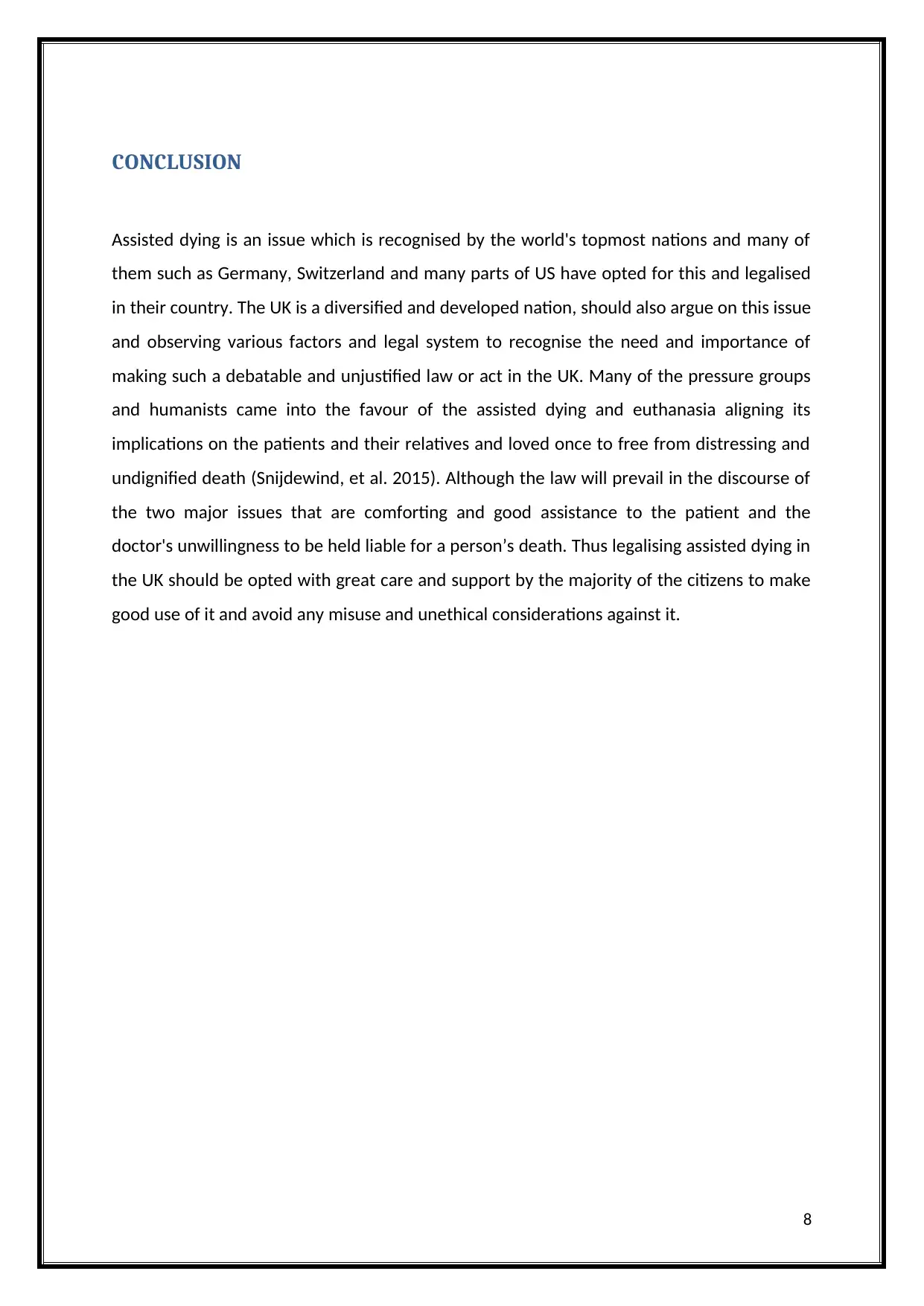
CONCLUSION
Assisted dying is an issue which is recognised by the world's topmost nations and many of
them such as Germany, Switzerland and many parts of US have opted for this and legalised
in their country. The UK is a diversified and developed nation, should also argue on this issue
and observing various factors and legal system to recognise the need and importance of
making such a debatable and unjustified law or act in the UK. Many of the pressure groups
and humanists came into the favour of the assisted dying and euthanasia aligning its
implications on the patients and their relatives and loved once to free from distressing and
undignified death (Snijdewind, et al. 2015). Although the law will prevail in the discourse of
the two major issues that are comforting and good assistance to the patient and the
doctor's unwillingness to be held liable for a person’s death. Thus legalising assisted dying in
the UK should be opted with great care and support by the majority of the citizens to make
good use of it and avoid any misuse and unethical considerations against it.
8
Assisted dying is an issue which is recognised by the world's topmost nations and many of
them such as Germany, Switzerland and many parts of US have opted for this and legalised
in their country. The UK is a diversified and developed nation, should also argue on this issue
and observing various factors and legal system to recognise the need and importance of
making such a debatable and unjustified law or act in the UK. Many of the pressure groups
and humanists came into the favour of the assisted dying and euthanasia aligning its
implications on the patients and their relatives and loved once to free from distressing and
undignified death (Snijdewind, et al. 2015). Although the law will prevail in the discourse of
the two major issues that are comforting and good assistance to the patient and the
doctor's unwillingness to be held liable for a person’s death. Thus legalising assisted dying in
the UK should be opted with great care and support by the majority of the citizens to make
good use of it and avoid any misuse and unethical considerations against it.
8
⊘ This is a preview!⊘
Do you want full access?
Subscribe today to unlock all pages.

Trusted by 1+ million students worldwide
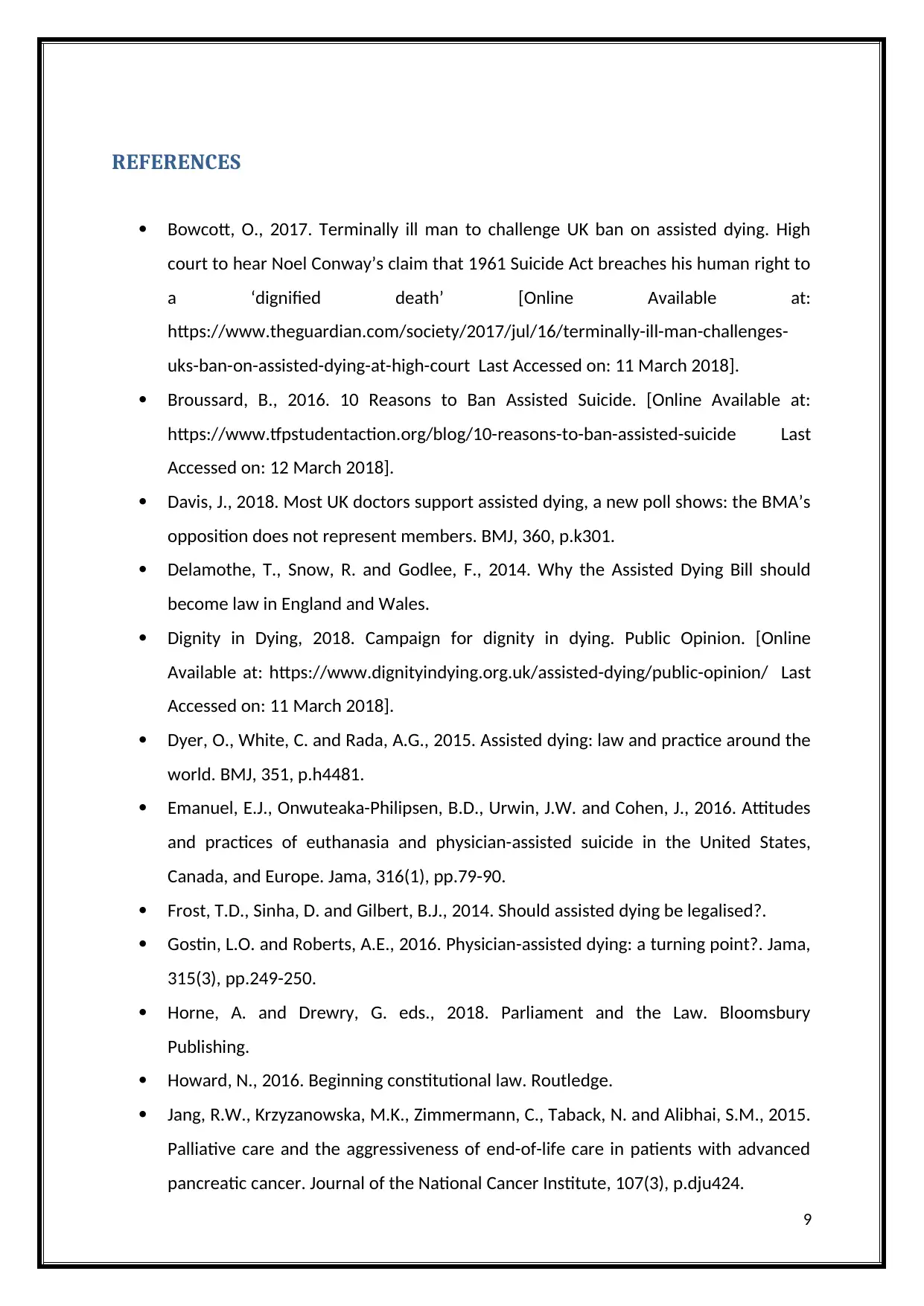
REFERENCES
Bowcott, O., 2017. Terminally ill man to challenge UK ban on assisted dying. High
court to hear Noel Conway’s claim that 1961 Suicide Act breaches his human right to
a ‘dignified death’ [Online Available at:
https://www.theguardian.com/society/2017/jul/16/terminally-ill-man-challenges-
uks-ban-on-assisted-dying-at-high-court Last Accessed on: 11 March 2018].
Broussard, B., 2016. 10 Reasons to Ban Assisted Suicide. [Online Available at:
https://www.tfpstudentaction.org/blog/10-reasons-to-ban-assisted-suicide Last
Accessed on: 12 March 2018].
Davis, J., 2018. Most UK doctors support assisted dying, a new poll shows: the BMA’s
opposition does not represent members. BMJ, 360, p.k301.
Delamothe, T., Snow, R. and Godlee, F., 2014. Why the Assisted Dying Bill should
become law in England and Wales.
Dignity in Dying, 2018. Campaign for dignity in dying. Public Opinion. [Online
Available at: https://www.dignityindying.org.uk/assisted-dying/public-opinion/ Last
Accessed on: 11 March 2018].
Dyer, O., White, C. and Rada, A.G., 2015. Assisted dying: law and practice around the
world. BMJ, 351, p.h4481.
Emanuel, E.J., Onwuteaka-Philipsen, B.D., Urwin, J.W. and Cohen, J., 2016. Attitudes
and practices of euthanasia and physician-assisted suicide in the United States,
Canada, and Europe. Jama, 316(1), pp.79-90.
Frost, T.D., Sinha, D. and Gilbert, B.J., 2014. Should assisted dying be legalised?.
Gostin, L.O. and Roberts, A.E., 2016. Physician-assisted dying: a turning point?. Jama,
315(3), pp.249-250.
Horne, A. and Drewry, G. eds., 2018. Parliament and the Law. Bloomsbury
Publishing.
Howard, N., 2016. Beginning constitutional law. Routledge.
Jang, R.W., Krzyzanowska, M.K., Zimmermann, C., Taback, N. and Alibhai, S.M., 2015.
Palliative care and the aggressiveness of end-of-life care in patients with advanced
pancreatic cancer. Journal of the National Cancer Institute, 107(3), p.dju424.
9
Bowcott, O., 2017. Terminally ill man to challenge UK ban on assisted dying. High
court to hear Noel Conway’s claim that 1961 Suicide Act breaches his human right to
a ‘dignified death’ [Online Available at:
https://www.theguardian.com/society/2017/jul/16/terminally-ill-man-challenges-
uks-ban-on-assisted-dying-at-high-court Last Accessed on: 11 March 2018].
Broussard, B., 2016. 10 Reasons to Ban Assisted Suicide. [Online Available at:
https://www.tfpstudentaction.org/blog/10-reasons-to-ban-assisted-suicide Last
Accessed on: 12 March 2018].
Davis, J., 2018. Most UK doctors support assisted dying, a new poll shows: the BMA’s
opposition does not represent members. BMJ, 360, p.k301.
Delamothe, T., Snow, R. and Godlee, F., 2014. Why the Assisted Dying Bill should
become law in England and Wales.
Dignity in Dying, 2018. Campaign for dignity in dying. Public Opinion. [Online
Available at: https://www.dignityindying.org.uk/assisted-dying/public-opinion/ Last
Accessed on: 11 March 2018].
Dyer, O., White, C. and Rada, A.G., 2015. Assisted dying: law and practice around the
world. BMJ, 351, p.h4481.
Emanuel, E.J., Onwuteaka-Philipsen, B.D., Urwin, J.W. and Cohen, J., 2016. Attitudes
and practices of euthanasia and physician-assisted suicide in the United States,
Canada, and Europe. Jama, 316(1), pp.79-90.
Frost, T.D., Sinha, D. and Gilbert, B.J., 2014. Should assisted dying be legalised?.
Gostin, L.O. and Roberts, A.E., 2016. Physician-assisted dying: a turning point?. Jama,
315(3), pp.249-250.
Horne, A. and Drewry, G. eds., 2018. Parliament and the Law. Bloomsbury
Publishing.
Howard, N., 2016. Beginning constitutional law. Routledge.
Jang, R.W., Krzyzanowska, M.K., Zimmermann, C., Taback, N. and Alibhai, S.M., 2015.
Palliative care and the aggressiveness of end-of-life care in patients with advanced
pancreatic cancer. Journal of the National Cancer Institute, 107(3), p.dju424.
9
Paraphrase This Document
Need a fresh take? Get an instant paraphrase of this document with our AI Paraphraser
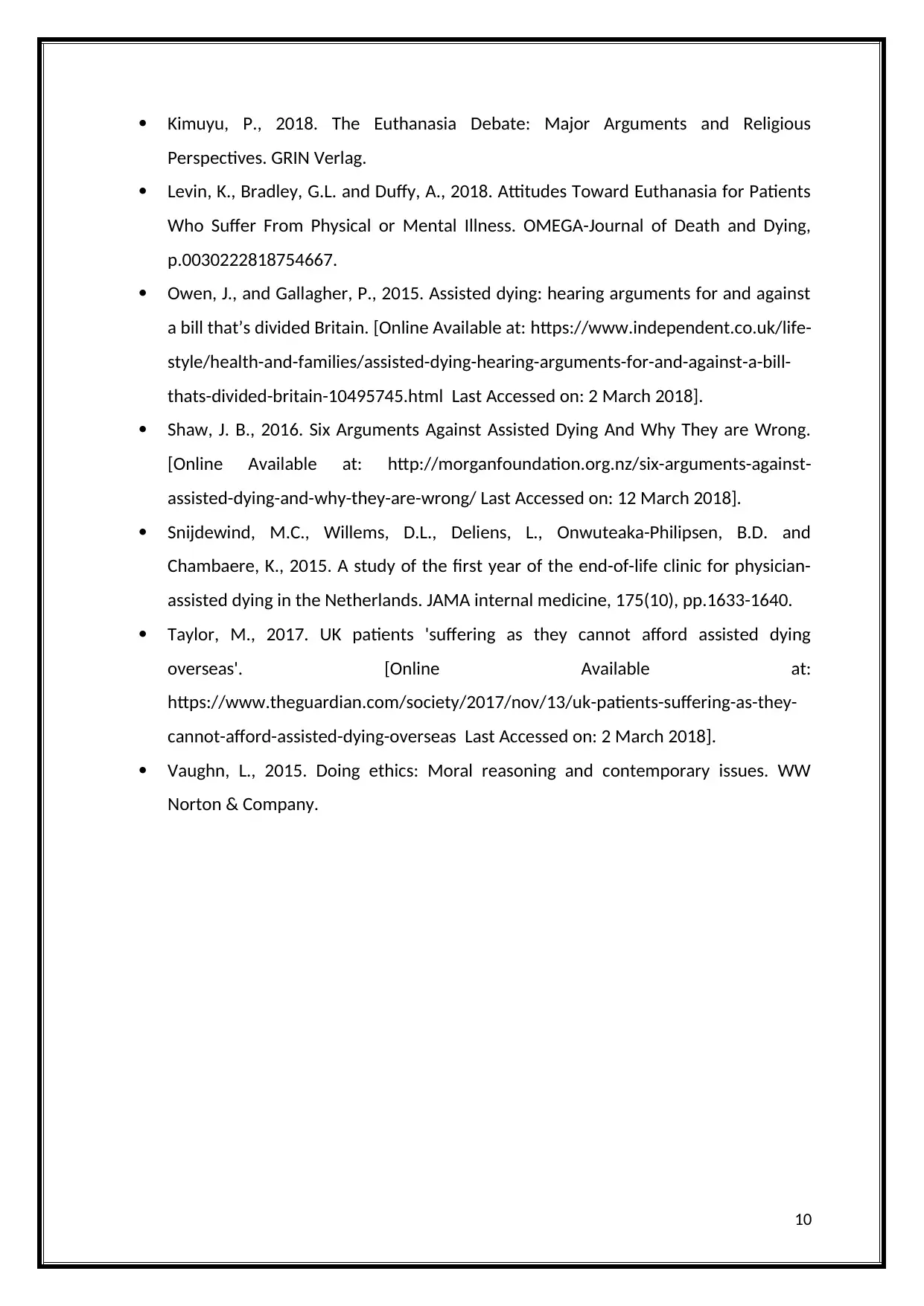
Kimuyu, P., 2018. The Euthanasia Debate: Major Arguments and Religious
Perspectives. GRIN Verlag.
Levin, K., Bradley, G.L. and Duffy, A., 2018. Attitudes Toward Euthanasia for Patients
Who Suffer From Physical or Mental Illness. OMEGA-Journal of Death and Dying,
p.0030222818754667.
Owen, J., and Gallagher, P., 2015. Assisted dying: hearing arguments for and against
a bill that’s divided Britain. [Online Available at: https://www.independent.co.uk/life-
style/health-and-families/assisted-dying-hearing-arguments-for-and-against-a-bill-
thats-divided-britain-10495745.html Last Accessed on: 2 March 2018].
Shaw, J. B., 2016. Six Arguments Against Assisted Dying And Why They are Wrong.
[Online Available at: http://morganfoundation.org.nz/six-arguments-against-
assisted-dying-and-why-they-are-wrong/ Last Accessed on: 12 March 2018].
Snijdewind, M.C., Willems, D.L., Deliens, L., Onwuteaka-Philipsen, B.D. and
Chambaere, K., 2015. A study of the first year of the end-of-life clinic for physician-
assisted dying in the Netherlands. JAMA internal medicine, 175(10), pp.1633-1640.
Taylor, M., 2017. UK patients 'suffering as they cannot afford assisted dying
overseas'. [Online Available at:
https://www.theguardian.com/society/2017/nov/13/uk-patients-suffering-as-they-
cannot-afford-assisted-dying-overseas Last Accessed on: 2 March 2018].
Vaughn, L., 2015. Doing ethics: Moral reasoning and contemporary issues. WW
Norton & Company.
10
Perspectives. GRIN Verlag.
Levin, K., Bradley, G.L. and Duffy, A., 2018. Attitudes Toward Euthanasia for Patients
Who Suffer From Physical or Mental Illness. OMEGA-Journal of Death and Dying,
p.0030222818754667.
Owen, J., and Gallagher, P., 2015. Assisted dying: hearing arguments for and against
a bill that’s divided Britain. [Online Available at: https://www.independent.co.uk/life-
style/health-and-families/assisted-dying-hearing-arguments-for-and-against-a-bill-
thats-divided-britain-10495745.html Last Accessed on: 2 March 2018].
Shaw, J. B., 2016. Six Arguments Against Assisted Dying And Why They are Wrong.
[Online Available at: http://morganfoundation.org.nz/six-arguments-against-
assisted-dying-and-why-they-are-wrong/ Last Accessed on: 12 March 2018].
Snijdewind, M.C., Willems, D.L., Deliens, L., Onwuteaka-Philipsen, B.D. and
Chambaere, K., 2015. A study of the first year of the end-of-life clinic for physician-
assisted dying in the Netherlands. JAMA internal medicine, 175(10), pp.1633-1640.
Taylor, M., 2017. UK patients 'suffering as they cannot afford assisted dying
overseas'. [Online Available at:
https://www.theguardian.com/society/2017/nov/13/uk-patients-suffering-as-they-
cannot-afford-assisted-dying-overseas Last Accessed on: 2 March 2018].
Vaughn, L., 2015. Doing ethics: Moral reasoning and contemporary issues. WW
Norton & Company.
10
1 out of 11
Related Documents
Your All-in-One AI-Powered Toolkit for Academic Success.
+13062052269
info@desklib.com
Available 24*7 on WhatsApp / Email
![[object Object]](/_next/static/media/star-bottom.7253800d.svg)
Unlock your academic potential
Copyright © 2020–2026 A2Z Services. All Rights Reserved. Developed and managed by ZUCOL.




